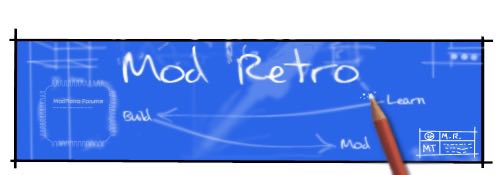I made a brief mention of this over at BH in passing, but now that I'm nearing the end of my N64 project (finaleeeee!) I'm getting ready to lay out plans for the next step in my N64 portable plans. Beforehand, I'd like to get a feel for what kind of demand this would have - I'm going to do it mainly as an exercise in microcontroller experience, but if there's people out there who wouldn't mind having the same benefit for their portables, then I may make it a more universal set up instead of just for the N64.
Here are my plans, thus far:
It's a large undertaking, particularly as I'm rather early in my microcontroller experience, but I'm pretty excited. The big obstacle that I see so far is designing the N64 package, and its required wiring, to be small enough to fit in the smaller portables that people are making these days. Hence my decision to go with the '128, as it'll proivde a very very thin profile for the application.
My end result in mind is to provide this modding community with the means to have some diagnostic ability for their portables, even if the data supplied is more superficial than helpful. I would love to be able to hook my N64 up to the computer to see how the TI regulator was doing, or to make sure that the 3.3v line is getting proper voltage, without having to deal with opening the case and finding that Dang elusive multimeter. (Ok, so maybe I'm the only one here that has kids that run off with multimeters.) I plan on providing a lot of the service, as I don't expect everyone here is able to flash their own micros. I think providing a supplemental parts list that can be somewhat easily obtained on Digikey, while providing the micros myself, would be a suitable arrangement for those few who might want to tackle this.
Thoughts?
Here are my plans, thus far:
Code:
N64 side:
Connectivity through the LOB64 port to cut down on holes required to cut
This should work just fine with an installed switch somewhere to switch betweeb LOB64 and diagnostic function.
May be forced to go with a mini-USB port instead, which wouldn't be that big of an intrusion.
Designing required circuit to sample processor temp, 3.3v and 12v line measurement, and digital signal detection to
determine if the N64 processor is, in fact, "talking" to the cart.
Current processor I'm aiming for is the Atmega128; it's small, powerful (likely much too powerful for what I need it for,
but eh,) and doesn't take much power at all. Break-out boards are cheap and easy to use.
I've begun minor development with the Atmega168, but the profile is a bit too large for my taste, as portables these
days need all the room they can get! Code migration between the devices isn't difficult, so will likely finish
development with the 168, as they are easier to deal with if they break.
PC side:
Utilitarian GUI, nothing fancy, just functional
Have begun work on this in Foxpro, not sure if I'm going to port over to Visual C++ yet.
USB connectivity
Firmware update support (in case of future upgrades, for whatever reason)It's a large undertaking, particularly as I'm rather early in my microcontroller experience, but I'm pretty excited. The big obstacle that I see so far is designing the N64 package, and its required wiring, to be small enough to fit in the smaller portables that people are making these days. Hence my decision to go with the '128, as it'll proivde a very very thin profile for the application.
My end result in mind is to provide this modding community with the means to have some diagnostic ability for their portables, even if the data supplied is more superficial than helpful. I would love to be able to hook my N64 up to the computer to see how the TI regulator was doing, or to make sure that the 3.3v line is getting proper voltage, without having to deal with opening the case and finding that Dang elusive multimeter. (Ok, so maybe I'm the only one here that has kids that run off with multimeters.) I plan on providing a lot of the service, as I don't expect everyone here is able to flash their own micros. I think providing a supplemental parts list that can be somewhat easily obtained on Digikey, while providing the micros myself, would be a suitable arrangement for those few who might want to tackle this.
Thoughts?


